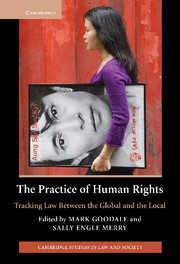Book contents
- Frontmatter
- Contents
- Contributors
- Acknowledgments
- Introduction Locating rights, envisioning law between the global and the local
- PART ONE STATES OF VIOLENCE
- PART TWO REGISTERS OF POWER
- Introduction
- 3 The power of right(s): tracking empires of law and new modes of social resistance in Bolivia (and elsewhere)
- 4 Exercising rights and reconfiguring resistance in the Zapatista Juntas de Buen Gobierno
- PART THREE CONDITIONS OF VULNERABILITY
- PART FOUR ENCOUNTERING AMBIVALENCE
- Conclusion Tyrannosaurus lex: the anthropology of human rights and transnational law
- Index
- References
Introduction
Registers of Power
Published online by Cambridge University Press: 29 March 2011
- Frontmatter
- Contents
- Contributors
- Acknowledgments
- Introduction Locating rights, envisioning law between the global and the local
- PART ONE STATES OF VIOLENCE
- PART TWO REGISTERS OF POWER
- Introduction
- 3 The power of right(s): tracking empires of law and new modes of social resistance in Bolivia (and elsewhere)
- 4 Exercising rights and reconfiguring resistance in the Zapatista Juntas de Buen Gobierno
- PART THREE CONDITIONS OF VULNERABILITY
- PART FOUR ENCOUNTERING AMBIVALENCE
- Conclusion Tyrannosaurus lex: the anthropology of human rights and transnational law
- Index
- References
Summary
In any discussion of human rights practice it is useful to return to the setting and contexts that preceded the 1948 Universal Declaration of Human Rights. Eleanor Roosevelt was Chair of the United Nations Human Rights Commission, a figure persistent in reminding her collaborators that they were charged with writing a declaration acceptable to all religions, ideologies, and cultures. The delegates from Western Europe, the Eastern Communist countries and Third World nations debated in philosophical terms the future of the declaration of human rights, each from their own particular view – the Chinese representatives insisting that Confucian philosophy be incorporated into the Declaration, the Catholics the teachings of St. Thomas Aquinas, the Liberals advocating the views of John Locke and Thomas Jefferson, and the Communists those of Karl Marx. There were no representatives from the places where indigenous peoples lived, nor from the peoples of Islam (Berger 1981). Eastern countries wanted to confine the charter to social and economic rights. Western countries wanted to inspire borrowings from the American Bill of Rights and the French Declaration of the Rights of Man.
Mrs Roosevelt, who was later nominated, but not awarded, the Nobel Prize had her own vision: “We hope its proclamation by the General Assembly will be an event comparable to the proclamation of the Declaration of the Rights of Man by the French people in 1789, the adoption of the Bill of Rights by the people of the United States, and the adoption of comparable declarations at different times in other countries (Berger 1981: 73).
- Type
- Chapter
- Information
- The Practice of Human RightsTracking Law between the Global and the Local, pp. 117 - 129Publisher: Cambridge University PressPrint publication year: 2007
References
- 3
- Cited by



